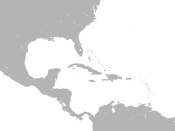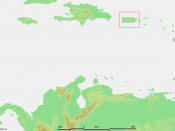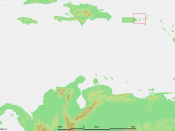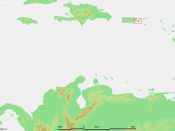Lewis' autobiographal statements show he was a a product of dying colonial order, and in turn was an intellectual contributor to the decolonization process. He was strongly against imperialism which lead to his interest in the problems of underdevelopment.
Three seminal publications
The first of these is the Industrialization of the West Indies. Lewis was averse to the ideas of the Economic Plan for Jamaica. His side of the argument stemmed from a stint with the Caribbean Commission in which he studied Puerto Rico's policies and he took this knowledge and used it as lessons for the West Indies.
One critique was of the comparative advantage in the export of primary goods and importation of manufactured goods. He argued that the over population of the islands provided an economic rationale for an industrialization strategy based on the export of labor intensive manufacturers. However since capital and technology was short in islands, foreign investors were invited to assist in that plan.
Foreign investors would provide distribution channels in overseas markets as they have done with Puerto Rico. His recommendations became the basis of industrial development policies in the West Indies in the 1950's.
The Dual Economy model-
The second publishing was on the agricultural revolution
The third seminal publication was on growth and fluctuation.
http://sta.uwi.edu/nlc/2008/documents/Girvan_Lecture_full.pdf
What is meant by "industrialisation by invitation" and did it lead to economic development in the region?
Industrialisation is the process of social and economic change whereby a social group is transferred from a manual labor based structure to a more technologically driven society and where the economy gains much more capital via manufacturing industries. Caribbean economies have been labeled as weak and dependent, and controlled by stronger foreign states and institutions (The Plantation Economy). Sir Arthur Lewis, St. Lucia's first Nobel Prize winner, has released several publications on the issue of underdeveloped nations in the Caribbean and solutions to correct this underdevelopment. Of these publications is the concept of "Industrialisation by invitation".
This notion holds that "scarcity of capital, skills and technology make it imperative to attract foreign investments". Stated differently, Caribbean people did not possess the competence and innovation for progression of their nations, therefore more advanced nations would invest and assist in the development of the Caribbean region. Prior to their independence, Caribbean countries were mainly used for the production of raw materials such as sugar, coffee and cotton, which were exported to the mother country where further processing and manufacturing was carried out. Lewis' idea emphasized the need for industrialisation to be introduced into the Caribbean in order for substantial development. Therefore Caribbean economies should adopt industries that are in alignment with their natural resources.
Contrary to New world economists' Plantation Model of the Caribbean Mr. Lewis proposed a model of his own dubbed the 'Dual Economy'. He stated that there was the traditional(agricultural sector) and the capitalist (profit making sector), the two sectors of the Caribbean economy. The traditional sector tend to focus on hiring as many as possible thus productivity declined whereas the capitalist sector focused on profit making and high productivity. Lewis recommended a shift of the excess labour from the traditional to capitalist sector, in turn increasing the capital of the economy. This concept bears that the Caribbean is well structured for an industrialised society and that labour was readily available to accommodate this structural change.
In theory as well as practice "industrialisation by invitation" was meant to attract both local and foreign investment through generous tax incentives which were mostly reserved for the benefit of foreign investors. Such incentives comprised of provision for basic infrastructure services such as harbours, airports and roads. Tariffs and quotas on imports to protect local goods against foreign competition was also another provision. This provision was important in that foreign goods, if not restricted, could easily penetrate and take control of the market, leaving no opportunity for local goods. State-supported training facilities for the local workforce in the form of technical institutions and universities added to the spur.
Though this entire concept was based on a development strategy for Puerto Rico called "Operation Bootstrap" and was successful for that island this was opposite for most of the remaining Caribbean region.

![[Portrait of Dizzy Gillespie, John Lewis, Cecil Payne, Miles Davis, and Ray Brown, Downbeat, New York, N.Y., between 1946 and 1948] (LOC)](https://s.writework.com/uploads/7/70016/portrait-dizzy-gillespie-john-lewis-cecil-payne-miles-davis-thumb.jpg)



